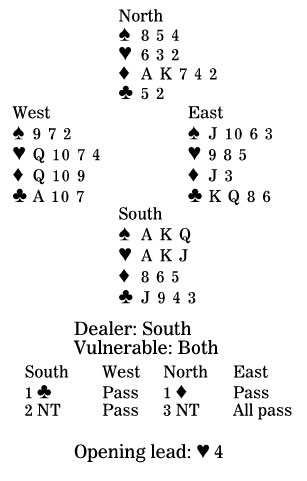How many tricks do you need?
By Phillip Alder ( China Daily ) Updated: 2014-10-11 15:37:09James Thurber, a cartoonist, playwright, author and wit, asked of an unknown voice, "If I called the wrong number, why did you answer the phone?"
In bridge, working out the right number is a big help. In this deal, South and East have to come up with the important figures.
South is in three no-trump. West leads the heart four. How should South plan the play?
South's two-no-trump rebid is in principle game-forcing. North may pass only with fewer than six points and no long suit. This agreement gives the responder the three-level to suggest alternative strains, or to start a slam investigation.
South has eight top tricks: three spades, three hearts (given the lead) and two diamonds. Obviously, he should hope for a 3-2 diamond break to generate the extra winner that he needs. But since dummy has no entry outside diamonds, South should lead a low diamond from his hand and play low from the board. What should happen after that?
It will be tempting for East to win the trick and return his second heart. But with this layout, South runs home with an overtrick.
Since West is known to have only four hearts (he led a fourth-highest four, and the two and three are in the dummy), East should realize that even if West has strong hearts, one diamond and three hearts will not produce the number of tricks needed to defeat the contract. Instead, East should hope his partner has good clubs. After overtaking West's diamond nine with his jack, East should shift to the club six. Here, that works perfectly.

|
|
|
|
|
|
|
|

























 Raymond Zhou:
Raymond Zhou: Pauline D Loh:
Pauline D Loh: Hot Pot
Hot Pot Eco China
Eco China China Dream
China Dream China Face
China Face






